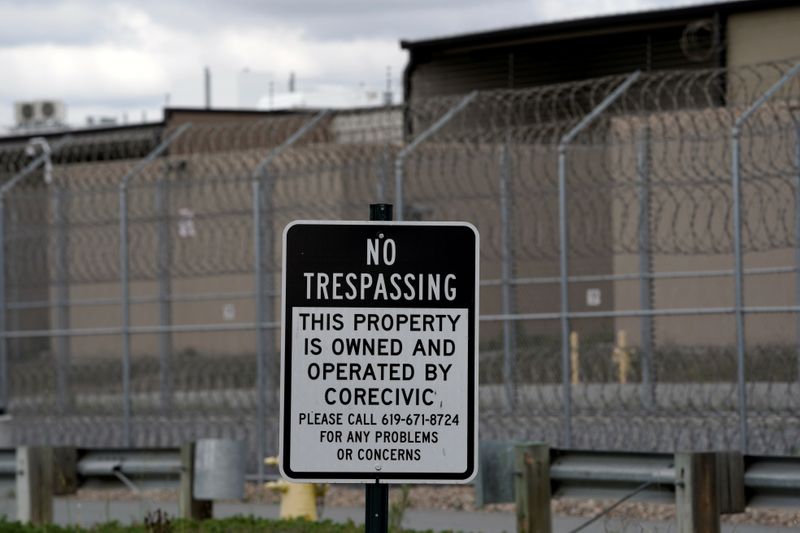By Kate Duguid
NEW YORK (Reuters) - CoreCivic (NYSE:CXW) and the GEO Group, two of the largest U.S. private prison companies, could lose as much as a quarter of their revenue, about $1 billion a year between them, under new limits on the sector from President Joe Biden.
Shares in GEO Group and CoreCivic took a hit on Tuesday after Biden signed an executive order to roll back the U.S. government's use of private prisons, a part of what he called an initiative to tackle systemic racism.
Tuesday's action left both stocks near their lowest levels in more than a decade. Both had recovered some of those losses on Wednesday morning, but remained near decade lows.
Biden's current order applies to the Justice Department's federal contracts with private prisons, which would include facilities used by the Bureau of Prisons and U.S. Marshals Service, though the order did not specifically name those agencies.
At GEO Group, U.S. Marshals and Bureau of Prisons accounted for 23% of total revenue in 2019, or about $570 million.
In 2019, CoreCivic earned 5% of its total revenue from its federal contracts with the Bureau of Prisons and 17% from the U.S. Marshals, or a total of about $440 million.
The largest customer in 2019 of both companies was U.S. Immigration and Customs Enforcement (ICE (NYSE:ICE)), accounting for 29% of CoreCivic's business and 22% of GEO Group's. The order does not apply to the Department of Homeland Security and therefore not to ICE facilities.
In response to requests for comments, both CoreCivic and GEO Group said the executive order would not mean big changes for their businesses.
"The (Bureau of Prisons) has experienced a steady decline in inmate populations over the past several years, so (Tuesday's) announcement was no surprise," said a CoreCivic representative.
A representative from GEO Group said the Bureau of Prisons had already announced steps over the past four months to not renew expiring contracts because of declining federal prison populations, in part due to the coronavirus pandemic.
"Given the steps the BOP had already announced, yesterday's executive order merely represents a political statement," he said.
Shares of GEO and CoreCivic had already been walloped in the past year as COVID-19 restrictions at the U.S.-Mexico border and capacity restrictions for health reasons kept facilities they operate for ICE well below capacity.
Both stocks have fallen more than 80% since the early days of Donald Trump's presidency, when his hardline immigration policies filled ICE facilities with detained immigrants.
"(The new order is) not a positive for GEO Group or CoreCivic, but it also doesn't blow up the business model," said Joe Gomes, senior research analyst at Noble (OTC:NEBLQ) Capital Markets.
Although the use of private prisons increased under Trump, activist and investor pressure had prompted some big Wall Street institutions to pull their support from the industry well before Biden's order.
In 2019, JPMorgan (NYSE:JPM), Bank of America (NYSE:BAC) and SunTrust - which had underwritten bonds or syndicated loans for CoreCivic and GEO Group - said they would stop financing private prison operations.
Neither prison company has raised money in public markets since 2019 and Biden's new order could increase credit risks, making it harder for either company to refinance debt.
GEO Group has a $250 million debt note due in January 2022, and CoreCivic has a $250 million note due in October 2022.

Both companies carry speculative-grade - or junk - ratings from Moody's (NYSE:MCO) and S&P, in part because their revenue is so susceptible to changes in government policy and public scrutiny of companies profiting from detention.